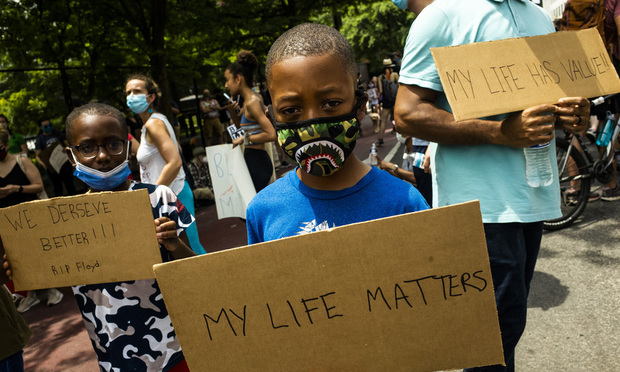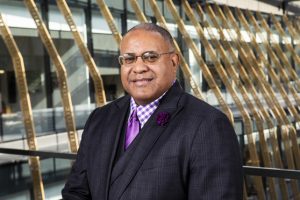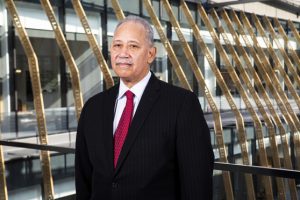From the NLJ Magazine: Black Firm Leaders on George Floyd and the Way Forward
I recently spoke with A. Scott Bolden, D.C. office managing partner of Reed Smith, and Ben Wilson, chairman of Beveridge & Diamond about inequality, inclusion and where they think progress could be made.
June 23, 2020 at 10:00 AM
8 minute read
 Thousands march in Washington, D.C. protesting police brutality and the killing of George Floyd in Minnesota at the hands of local police, on Saturday, June 6, 2020. Mass demonstrations have taken place nationwide since the incident took place.
Thousands march in Washington, D.C. protesting police brutality and the killing of George Floyd in Minnesota at the hands of local police, on Saturday, June 6, 2020. Mass demonstrations have taken place nationwide since the incident took place.
Editor's Note: This conversation was originally recorded for ALM's Legal Speak podcast, co-produced by Charles Garner and Vanessa Blum. We included key excerpts in the NLJ's July/August print edition. They follow below.
On June 4, I spoke with two African American law firm leaders based in Washington, D.C., about the weighty conversations that George Floyd's death has generated across the country.
Floyd, an African American man, had died just 10 days earlier when a white police officer in Minneapolis pinned his knee into Floyd's neck. The incident, captured on video, prompted protests around the nation.
My aim in conversing with A. Scott Bolden, D.C. office managing partner of Reed Smith, and Ben Wilson, chairman of Beveridge & Diamond, was to explore the context behind the frustration, sorrow and anger people were experiencing and to examine where they think progress could be made.
Bolden, a Howard Law graduate who specializes in white-collar defense, and Wilson, a Harvard Law graduate who focuses on environmental law, placed Floyd's death within the context of American history, shared their own experiences with racism and voiced their hopes for greater inclusion. Excerpts from our conversation follow below.
Ben Wilson, Scott Bolden, thank you for joining us. It's been a very trying week. Ben, there was a recent interview where you discussed what you felt when you saw the video of George Floyd dying under the knee of a Minneapolis police officer. You said you thought about this incident and others, some recent, some more historic, like the murder of Emmett Till. How does history inform what we saw? And how do you place it in the larger context of the African American experience in this country?
Ben Wilson: Well Lisa, like so many, I was shocked, I was angered. I still feel anger and frustration when I saw that video of George Floyd being murdered. It did bring back to mind historic murders like Emmett Till, a 14-year-old boy who allegedly whistled at a white woman. His body was mutilated. His mother insisted on an open casket so people would know he could not have done this to himself. I was reminded of Jimmie Lee Jackson, who was a deacon in a church in Alabama, [and] was active in the civil rights movement. And his murder by state police officers was one of the galvanizing events of the Selma march. And I'm reminded of those three young men [James] Chaney, [Andrew] Goodman and [Michael] Schwerner, who were murdered by Klansmen, and also a gentleman who happened to be the sheriff was part of that group, in Neshoba County, Mississippi, in 1964. So yes, historically, those issues are linked, where the law did not respect our rights. And today, there are names that would take, sadly, too long to call—most recently, Ahmaud Arbery, Breonna Taylor, the woman from Louisville, Kentucky. And these are great, great losses. This is why we have to have a change in this country.
 A. Scott Bolden, of Reed Smith.
A. Scott Bolden, of Reed Smith.Scott, I saw a tweet that Mo Cowan, the former U.S. senator, posted. It reads: "I'm a college grad. I'm a law school grad. I'm a corporate executive. I've held senior positions in state government. I've served in the U.S. Senate. I'm not immune. I'm not free of fear. I'm not comfortable around police. I'm black in America." Does that quote resonate with you?
Scott Bolden: It certainly does. I often tell young people when it comes to police brutality that our economics and education may separate us, but race is the tie that binds us. Every black man has a story, a negative story, about the police. I've lived the American dream. I've never been arrested before. I'm highly educated. I've scaled the top of Big Law, not only in management, but in client service, business generation and revenue generation. And yet, I've got my story about the police: either pulling me out of my house because the burglar alarm went off in a nice neighborhood that I worked hard for, following me in my nice car simply to ask where I'm going, threatening to arrest me and putting me in handcuffs outside of a client's restaurant and nightclub, simply because I was leaving one car as a passenger and getting into my black car with a driver and being told by the police to stay put. The police officer was simply writing a ticket for being double parked. And by the way, it wasn't my car and I wasn't driving.
When we talk about change, this has to be a seminal moment for not just black people, but white America. We need to ask white America to do more. In order to eliminate systemic racism, not just in the police department, but elsewhere, I need my white brothers and sisters to confront racism. I need them to stop tolerating it. I need them to stop telling me that they're not racist when they live among racists in this country. I need them to address it, eliminate it, challenge it, make it go away. That's the only way we're going to get to the next level. Systemic racism is never going to go away until all of us step up. We certainly have to do our part as African Americans, but we need to partner with our white brothers and sisters to finally allow America to fulfill her promise of freedom, justice and equality.
Ben and Scott, you serve, respectively, as chairman and D.C. office managing partner of your firms. Do you ever feel like you have to separate your experience as an African American man in the world and your role as a firm leader?
Wilson: I don't feel that I have to separate my blackness or my racial identity from my role as chairman of the firm. Quite frankly, when we are doing those things, we're not being authentic. I don't think you can be a real leader if you aren't authentic. And I want to bring my whole self to the work that I do chairing my firm. Everyone else does. And I'm unapologetically African American. I believe those experiences have shaped my thinking, they are of value. They help to allow me to make a worthwhile contribution, just as the background of others helps them to make a worthwhile contribution. So, I think it's extremely important that we are authentic.
 Benjamin Wilson, with Beveridge & Diamond in Washington, D.C., on November 20, 2019.
Benjamin Wilson, with Beveridge & Diamond in Washington, D.C., on November 20, 2019.Bolden: I agree with everything Ben says. When you get me, you get all of me. People know exactly where I stand. I encourage diversity. I want our lawyers talking about these issues of gender discrimination, race discrimination. Not just optics, but what we're doing about it. How we pitch business, who we put on teams. I don't want my team, black, white, yellow or brown, to be afraid of talking about the tough issues of race and race discrimination and what's going on in this country.
For the legal profession, what lessons can be brought back to law firms to create more inclusive cultures and is it reasonable to expect that this greater national dialogue will cause firm leaders to look more closely at how bias might come up in firm cultures?
Wilson: Well, "it could" is the answer. And I certainly hope it will. But it's incumbent on us to challenge each other as leaders, to challenge our leaders and others within our firms about what we are doing in our practice. Are we inclusive? Do we field a pitch team that includes men and women, that includes African American attorneys, that includes other diverse attorneys? Are we promoting people? Are we offering opportunity to people from all groups? Are we using our firm's resources to directly impact the community and to address these very issues of criminal justice reform? In [the legal profession], our skills put us at the heart of these issues. But it takes more than skill. It takes a conviction. It takes a commitment. That is what will be essential to make a change.
This content has been archived. It is available through our partners, LexisNexis® and Bloomberg Law.
To view this content, please continue to their sites.
Not a Lexis Subscriber?
Subscribe Now
Not a Bloomberg Law Subscriber?
Subscribe Now
NOT FOR REPRINT
© 2025 ALM Global, LLC, All Rights Reserved. Request academic re-use from www.copyright.com. All other uses, submit a request to [email protected]. For more information visit Asset & Logo Licensing.
You Might Like
View All

Law Firms Mentioned
Trending Stories
Who Got The Work
J. Brugh Lower of Gibbons has entered an appearance for industrial equipment supplier Devco Corporation in a pending trademark infringement lawsuit. The suit, accusing the defendant of selling knock-off Graco products, was filed Dec. 18 in New Jersey District Court by Rivkin Radler on behalf of Graco Inc. and Graco Minnesota. The case, assigned to U.S. District Judge Zahid N. Quraishi, is 3:24-cv-11294, Graco Inc. et al v. Devco Corporation.
Who Got The Work
Rebecca Maller-Stein and Kent A. Yalowitz of Arnold & Porter Kaye Scholer have entered their appearances for Hanaco Venture Capital and its executives, Lior Prosor and David Frankel, in a pending securities lawsuit. The action, filed on Dec. 24 in New York Southern District Court by Zell, Aron & Co. on behalf of Goldeneye Advisors, accuses the defendants of negligently and fraudulently managing the plaintiff's $1 million investment. The case, assigned to U.S. District Judge Vernon S. Broderick, is 1:24-cv-09918, Goldeneye Advisors, LLC v. Hanaco Venture Capital, Ltd. et al.
Who Got The Work
Attorneys from A&O Shearman has stepped in as defense counsel for Toronto-Dominion Bank and other defendants in a pending securities class action. The suit, filed Dec. 11 in New York Southern District Court by Bleichmar Fonti & Auld, accuses the defendants of concealing the bank's 'pervasive' deficiencies in regards to its compliance with the Bank Secrecy Act and the quality of its anti-money laundering controls. The case, assigned to U.S. District Judge Arun Subramanian, is 1:24-cv-09445, Gonzalez v. The Toronto-Dominion Bank et al.
Who Got The Work
Crown Castle International, a Pennsylvania company providing shared communications infrastructure, has turned to Luke D. Wolf of Gordon Rees Scully Mansukhani to fend off a pending breach-of-contract lawsuit. The court action, filed Nov. 25 in Michigan Eastern District Court by Hooper Hathaway PC on behalf of The Town Residences LLC, accuses Crown Castle of failing to transfer approximately $30,000 in utility payments from T-Mobile in breach of a roof-top lease and assignment agreement. The case, assigned to U.S. District Judge Susan K. Declercq, is 2:24-cv-13131, The Town Residences LLC v. T-Mobile US, Inc. et al.
Who Got The Work
Wilfred P. Coronato and Daniel M. Schwartz of McCarter & English have stepped in as defense counsel to Electrolux Home Products Inc. in a pending product liability lawsuit. The court action, filed Nov. 26 in New York Eastern District Court by Poulos Lopiccolo PC and Nagel Rice LLP on behalf of David Stern, alleges that the defendant's refrigerators’ drawers and shelving repeatedly break and fall apart within months after purchase. The case, assigned to U.S. District Judge Joan M. Azrack, is 2:24-cv-08204, Stern v. Electrolux Home Products, Inc.
Featured Firms
Law Offices of Gary Martin Hays & Associates, P.C.
(470) 294-1674
Law Offices of Mark E. Salomone
(857) 444-6468
Smith & Hassler
(713) 739-1250












